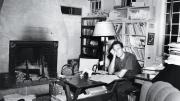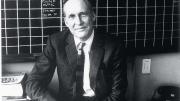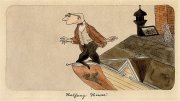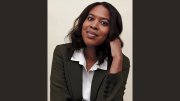James Laughlin ’36, an heir of the Jones & Laughlin Steel Corporation of Pittsburgh, founded the avant-garde publishing house New Directions three years before he finally graduated from Harvard, not too long after Ezra Pound allegedly told him, “[Y]ou’re never going to be any good as a poet. Why don’t you take up something useful?” and then refined that advice: “You’d better become a publisher. You’ve probably got enough brains for that.”
New Directions would publish not only Pound himself, but such notable American and foreign writers as William Carlos Williams, Denise Levertov, Thomas Merton, and Delmore Schwartz alongside Dylan Thomas, Vladimir Nabokov, Hermann Hesse, Yukio Mishima, and Jorge Luís Borges. And Laughlin himself would continue to write poetry, despite Pound’s critique; The Collected Poems of James Laughlin (edited by Peter Glassgold for New Directions) appears this November in conjunction with a new Laughlin biography.
Ian S. MacNiven’s “Literchoor Is My Beat”: A Life of James Laughlin, Publisher of New Directions (Farrar, Straus and Giroux) presents a lively and revealing portrait of the man, he writes, who “practiced disappearance” and yet, “more than any other man of the twentieth century, directed the course of America writing and crested the waves of American passions and preoccupations,” publishing more than 1,500 books by others and writing more than 30 of his own. The following excerpt from chapter three, “Harvard, Part One,” highlights some of the influences pushing an already precocious undergraduate toward that catalytic meeting with Pound.
~The Editors
James Laughlin IV’s father wept—or so his son claimed—when the youth told him that he had settled on Harvard. A few years later Henry Hughart [Laughlin] wrote to Carey Briggs* about “J.’s deserting Princeton for the college of the Jews & Beaconhillites.” The number of Jews at Harvard might have been limited by quota, but prominent Jews among the alumni included Justice Louis Brandeis (1877) of the Supreme Court and Lincoln Kirstein (1930), already a force in the arts and literature. James’s mother probably considered her son’s choice in religious terms: Princeton was heavily Presbyterian, and she had hoped that the college might reinvigorate her son’s straying faith. Although he credited [Dudley] Fitts with pushing him toward Harvard, the choice was his own. Harvard sealed his escape from Pittsburgh to New England, to the oldest, most richly endowed, and most intellectual institution of higher learning in the nation. Harvard also marked the emergence of James’s preference for signing himself with the shortened Jay, then to the bare J, and he soon dropped the Roman numeral.
J’s father put a good face on the inevitable and escorted him to Cambridge. He would share a two-bedroom suite with Lawrence Angel, a classmate at Choate. Their rooms in Weld Hall in Harvard Yard included a good fireplace, but J’s father pronounced the furniture appalling, so at an antiques store they bought two vintage American desks, a pair of bookcases, and a Persian rug with drapes to match. Mr. Lucas, Hughart’s English tailor in Cambridge, measured J for a tuxedo, three pairs of dark gray trousers, and three tweed jackets—“suits / Were not worn at Harvard,” J said.** A supply of striped and plain shirts and the customary white bucks (worn very dirty, commented Mr. Lucas disapprovingly) completed the basic wardrobe.
That evening Hughart took J to Concord to visit cousin Henry Laughlin, then head of the Riverside Press division of Houghton Mifflin. “What a spread!” recalled J. “Twenty acres of meadow, with / Horses grazing.” Cousin Henry had bought Castle Hyde in Ireland and rode to hounds. “Plumpish and jolly,” with rosy cheeks, he did not strike J as a typical Laughlin: he was a risk taker and a skier, and a horse had “nearly killed him by refusing a stone wall.” The Concord Laughlins were useful to J; Henry’s wife, Becky, volunteered to get J on the “dance list” so that he would be invited to Beacon Hill debutante balls, where he had heard that the girls were “nonflammable / But very pretty.” Becky came from exalted stock, so she could vouch for his being sufficiently wellborn. Though J might be snubbed by the Groton and Milton preppies attending Harvard, he would not, thanks to his cousins, be denied Brahmin society.…
Excused from freshman English, J elected yearlong courses in biology, history, Italian, and philosophy.…J soon discovered that, by and large, “the faculty didn’t / Really expect much of us / Freshmen.” One exception was…a section leader in history, for whom J wrote a paper on Spengler, quoting extensively in German.…“This is all / Balderdash,” he told J, “I want your / Ideas, not Spengler’s.” J was learning the difference between the appearance of accomplishment and the thing itself. So he assessed his instructors, turning in fodder when he thought he could get away with it. Marks, he now said, meant little to him. Being top boy might have counted for everything at Choate; at Harvard he wanted learning, not accolades. He cut many classes, passing often through the neo-Corinthian columns of the Widener Library, where he boasted that he had “conned” an attendant into giving him, a mere freshman, stack privileges. On his own, he began translating Virgil.
J arrived at Harvard with a few friends from Choate, and he soon made others. Joe Pulitzer was a grandson of the great newspaperman. He collected impressionist paintings, performed beautifully on his own grand piano in his suite, and, so J claimed, kept a French mistress at the Boston Ritz. J liked him even though Pulitzer teased him for never having visited St. Mark’s in Venice.…“Lord Melcarth”—Ba’al Melcarth or Moloch—was the assumed name of a Lebanese painter who wore a monocle and carried a malacca cane topped by a silver devil’s head. Melcarth had a friend, Wayne Andrews, who wrote good French, corresponded with Ezra Pound, and knew many of the French surrealists.
Toward the end of his freshman year, J was accepted as a “heeler” for The Harvard Advocate, the undergraduate literary journal. Advocate House was a small wooden building in an alley, with tables, chairs, and a worn leather couch, all comfortably scruffy: a den in which serious young writers could play at being bohemian. In fact, he was given more responsibilities than the errand boy designation implied; one of his successful crusades was to overcome the editors’ “violent objections” toward publishing Andrews’s essay on surrealism.
His time at the Advocate was probably the best of J’s early Harvard life. Its president when J joined the staff was Cyrus Sulzberger of the New York Times family. J would work with Peter Viereck, Arthur Schlesinger Jr., Leonard Bernstein, and Robert Fitzgerald. In 1935, John Jermain Slocum, called Jim, would be elected president: he became a friend for life, as did Fitzgerald. Robert Lowell, although he had been rejected when he applied to become a candidate for the literary board, would drop by the offices. The monthly tried to give voice to serious and even experimental poetry: the undergraduate verse of Eliot, Cummings, Wallace Stevens, and Edwin Arlington Robinson had appeared in its pages. Dulce est periculum—Sweet is danger—was the motto, inherited from a predecessor student publication closed down for opposing mandatory chapel attendance. Originality meant taking risks, and earlier risk takers on the Advocate staff had included Theodore and Franklin D. Roosevelt, the future Scribner’s editor Maxwell Perkins, Conrad Aiken, Fitts, James Gould Cozzens, and Lincoln Kirstein.
J’s freshman year coincided with the appointment of T. S. Eliot as Charles Eliot Norton Professor of Poetry. Eliot was extremely generous in his efforts, and in addition to his four mandated public Norton Lectures at Harvard, he taught an undergraduate course on modern English literature. J probably audited the two of Eliot’s classes that were specifically devoted to Pound and Anglo-American poetry. Emboldened by having studied Eliot’s poetry with Fitts, J introduced himself. “Ole / Possum,” he would recall, “Was very amiable for a High / Anglican.” When J commented to Eliot on a plate of cookies on the floor in the middle of the room at the Eliot House suite that he used for group conferences with students, the great man explained in his measured tones, “ ‘It’s economical,’ he / Told me, ‘they’re too polite / To go out and grab cookies. / That plate has been there for / Five weeks.’ ”
Still, sitting at the feet of the famous was not all J had hoped for at Harvard. He expected epiphanies. But the classes seemed pedestrian, the assignments antediluvian.…
On his return from Christmas recess, J took up skiing seriously.…
The skiing weekend became part of J’s Harvard routine: a six-hour drive to Stowe in Vermont’s Green Mountains, slightly less to the New Hampshire ski areas.…J and his friends climbed with sealskins on their skis. If blizzard conditions permitted, they could make it in two hours, carrying sleeping bags and supplies, up to the Harvard Mountaineering Club hut in Tuckerman Ravine on Mount Washington, New Hampshire.
…
Despite…intriguing companions, J poured out his usual discontents to his old mentor, Fitts, who volunteered a letter of introduction to Ezra Pound. Fitts also appeared at the beginning of April in Cambridge to encourage his star alumnus. “Waiting & watching & doing precisely nothing,” wrote J in a grumpy mood. “Dudley was in with a few choice words of bull-shit.”
It wasn’t just Harvard that J was bored with. It was Pittsburgh, Cambridge, Boston, even Norfolk—it was America. He wanted Europe. “We didn’t think that one glimpse of an oxcart would turn us into geniuses, but we were sure that things would be different in Europe,” J would write after a European trip in 1934, “that barriers inside us that had kept us from writing anything more startling at home than fairly adept imitations would somehow be moved away by the new life.” However, J was not quite willing to cut his ties to Harvard and transplant himself to Paris.
During the spring term J’s college experience seemed to be engaging him more. Theodore Spencer, an instructor in English, wrote to J in February 1933 that he had gotten his name from Fitts. Spencer was the main Harvard liaison and understudy for Eliot, and his acquaintance helped ease J into the circle around Eliot. Harry Levin, another instructor in English, would become important to J as a future author on James Joyce and as a connecting figure. Levin had been in the first class F. O. Matthiessen taught at Harvard, and like Spencer he had been singled out by Eliot for his brilliance. And when Robert Fitzgerald was asked by Sulzberger to collect material for the next Advocate, he invited J to his room for a consultation. Fitzgerald had graduated from Choate just before J had arrived, but the school bond and their shared love of the Greek classics led to almost immediate friendship.
…Reviewing the May Advocate, Matthiessen named J’s “The Day Is Over,” reprinted with permission from The Atlantic Monthly, as “easily the best contribution to this issue.” “The effect of the whole piece is authentic,” Matthiessen concluded. This was a considerable tribute coming from Matthiessen, whose monumental study, American Renaissance, would shortly earn him towering status among scholars of American literature.
 |
From the Archives: Download “Cantos and the Stem Christie,” this magazine’s 1995 article on James Laughlin (PDF) |
At the instigation of a Childs cousin who “owned half of it,” J became the Harvard stringer for The Harkness Hoot at Yale, a new and short-lived competitor to the venerable Yale Literary Magazine. His first article for the Hoot was an erudite nine pages on Archibald MacLeish, whose long poem, Conquistador, had just received a Pulitzer Prize. When the Hoot was also praised for a “saner attitude” and for becoming “a serious journal of discussion,” J felt that he had contributed to change at Yale as well.…
In the spring of 1933, J sent his short story “The River” to Lincoln Kirstein, co-founder of The Hound and Horn, which Pound usually referred to as “Bitch & Bugle”—the journal’s name had come from his own poem “The White Stag.” “I’m sorry to say that Lincoln did not like your river story at all,” reported Fitts. Kirstein was “one of my idols,” J said, a man who used his wealth in service of high artistic values. He was a member of a Thursday evening supper group, as were J, R. P. Blackmur, John Cheever, Fitts, and “dear old Sherry Mangan,” that met at the Ararat Café or the Athens Olympia. J said that he was in awe of Kirstein, seven years his senior and “such a brilliant man…doing such great work.” Tall and powerfully built, Kirstein was painted, wearing absolutely nothing but a pair of boxing gloves, by Pavel Tchelitchew, one of many artists he championed. Mangan—poet, novelist, and book designer—was as striking an individual as Kirstein. When a friend produced a bookplate for him, the motto on it read, “Everything in Excess,” and in his case this meant books, ideas, dinners of curry, chateaubriand, shellfish, and wine, topped with good company in lavish quantities. Although not of great height, his massive, square frame made him seem very big, and a shock of red-blond hair crowned his animated, humorous face. His conversation raced and skipped in jolly flights of wit and invention. New England aristocrat that he was, the Depression had turned him into a passionate Trotskyite.
J was also receiving attention from at least four young women, and with his many extracurricular interests it is hardly surprising that his freshman year record was not outstanding: his grades for his four credit courses were C, B, B, and A. He received an Excellent for the noncredit but mandatory physical training.
The old prejudices lingering from Pittsburgh were crumbling under J’s independence and what can best be called his innate sense of fairness. In his admiration for the shy brilliance of Levin and the outspoken if often abrasive idealism of Kirstein, J gradually became ashamed of the anti-Semitic turns of speech accepted without demur by his family. His already quite egalitarian attitudes about race were becoming more liberal as well. A score of years before there was an active movement to integrate public schools, Kirstein was campaigning for an equal representation of black and white students at the ballet school he envisioned. J’s friend Wayne Andrews became the first white Harvard student to take a black girl as a date to a freshman dance. And J’s friendships had far outstripped in diversity his Pittsburgh circle.…To most young men, J’s intellectual experience and circle of acquaintance would have added up to a highly satisfactory initial year at Harvard. J, however, was yearning to escape. He would make use of Fitts’s letter of introduction to Pound.









